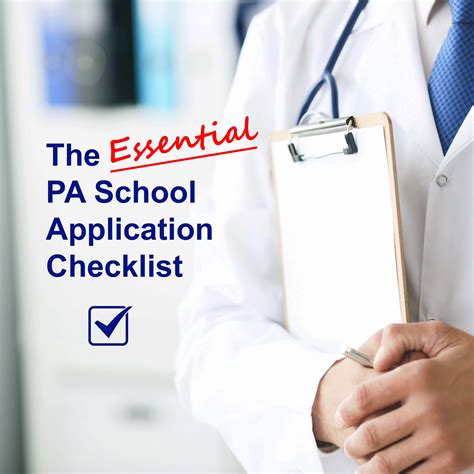The journey to becoming a Physician Assistant (PA) is an exciting yet challenging one. As a prospective PA student, you're about to embark on a rigorous application process that requires meticulous planning and attention to detail. A well-organized checklist is essential to ensure you stay on track and increase your chances of securing a spot in a reputable PA program.
In this article, we'll provide you with a comprehensive PA school application checklist, highlighting the essential components to focus on during your application journey. We'll also offer valuable tips and insights to help you navigate the process with confidence.
Understanding the PA School Application Process
Before we dive into the checklist, it's crucial to understand the PA school application process. The majority of PA programs participate in the Centralized Application Service for Physician Assistants (CASPA), which allows applicants to submit a single application to multiple programs.
The application cycle typically begins in April or May of each year, with deadlines ranging from September to January of the following year. It's essential to research your desired programs' specific deadlines and requirements to ensure you're well-prepared.
PA School Application Checklist Essentials
I. Pre-Application Requirements
- Bachelor's Degree: Earn a bachelor's degree from an accredited institution in a science-related field, such as biology, chemistry, or physics.
- Prerequisite Courses: Complete the required prerequisite courses, including:
- Anatomy and Physiology
- Biochemistry
- Biology
- Chemistry
- Microbiology
- Physics
- Psychology
- Statistics
- GPA: Maintain a strong overall GPA and science GPA (3.0 or higher).
- Healthcare Experience: Gain a minimum of 1,000 hours of direct patient care experience, such as:
- Certified Nursing Assistant (CNA)
- Emergency Medical Technician (EMT)
- Medical Assistant (MA)
- Registered Nurse (RN)

II. Application Materials
- CASPA Application: Submit your application through CASPA, including:
- Personal statement ( essays)
- Transcripts
- Letters of recommendation
- Resume
- Work experience
- Letters of Recommendation: Secure letters from:
- Academic professors
- Healthcare professionals
- Supervisors
- Resume: Create a tailored resume highlighting your:
- Education
- Healthcare experience
- Skills
- Volunteer work
- Personal Statement: Craft a compelling personal statement showcasing your:
- Motivation for becoming a PA
- Career goals
- Relevant experiences
- Unique qualities

III. Exams and Assessments
- GRE: Prepare for and take the Graduate Record Examinations (GRE), if required by your programs.
- PA-CAT: Take the Physician Assistant College Admission Test (PA-CAT), if required by your programs.
- TOEFL: Take the Test of English as a Foreign Language (TOEFL), if English is not your native language.

IV. Program Research and Selection
- Research Programs: Investigate PA programs, considering factors such as:
- Accreditation
- Curriculum
- Clinical rotations
- Program length
- Tuition
- Create a Program List: Develop a list of 5-10 programs that align with your goals and preferences.
- Review Program Requirements: Verify each program's specific requirements, including:
- GPA
- Prerequisite courses
- Healthcare experience
- Exams

V. Application Submission and Follow-up
- Submit Applications: Submit your applications through CASPA, meeting each program's deadline.
- Follow-up: Monitor your application status, and follow up with programs as needed.

Conclusion
The PA school application process can be overwhelming, but with a comprehensive checklist, you'll be well-prepared to tackle each component. Remember to stay organized, focused, and committed to your goals. By following this checklist, you'll increase your chances of securing a spot in a reputable PA program and taking the first step towards a rewarding career as a Physician Assistant.
Gallery of PA School Application Checklist Essentials






FAQ Section
What is the average GPA for PA school applicants?
+The average GPA for PA school applicants varies, but a strong science GPA (3.0 or higher) is recommended.
How many hours of healthcare experience do I need for PA school?
+A minimum of 1,000 hours of direct patient care experience is recommended for PA school applicants.
Can I apply to PA school without taking the GRE?
+Some PA programs do not require the GRE, but it's essential to check each program's specific requirements.
